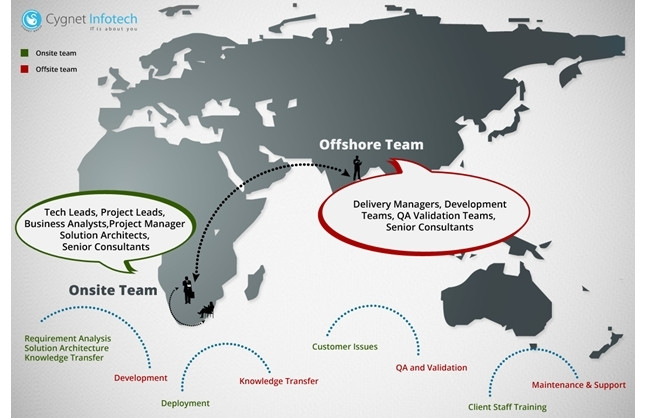African enterprises and businesses are poised for growth with increasing demand for both technology and expertise, and IT is the fuel propelling them to the next level. The rising demand for software services, solutions and products in businesses today, in conjunction with lack of skilled IT talent, compels businesses to look for consultants and resources elsewhere.

A majority of organisations continue to stick to an old, tried-and-tested, but intensive, formula to fulfil their technology needs.
In absence of home-grown IT talent, businesses rely on contracting entire teams from an outsourcing provider, or start hiring in-house. On one side, this enables businesses to get the work done internally and exercise greater control over the projects. But, on the flip side, it drives up the cost of development considerably high - because all costs for the project, both direct and indirect, are factored in the final results.
While this approach does help in the short term, companies are hitting a cost optimisation wall by not tapping into the potential of fast-moving enablers in the market. As finding and retaining skilled resources becomes increasingly difficult, this old IT delivery model is getting less and less sustainable: it is only good as a stopgap, short-term solution.
Outsourcing appears to be the next logical step, but most businesses are not keen to invest in time-consuming processes and documentation. Without a well-defined and mature software development process, it is simply not on the menu. So, even if an enterprise wants to explore cost-cutting, there are limited options on the cards.
This has created a catch-22 situation: The dependence on available resources precludes the need to invest in process understanding and governance, while the lack of well-defined and mature processes inhibits the exploitation of lower-cost IT delivery models.
We, at Cygnet Infotech, an application development services and enterprise software solutions provider, have recognised this gap and have started offering businesses a global delivery model. With over 14 years of experience in successfully delivering solutions to businesses spread across the globe, we offer a way to end the conundrum.
The need of the hour is an IT delivery model that enables businesses to keep it local and still reduce the costs. Obviously, the traditional IT delivery models don't work. To get around this problem, we have evolved this Global Delivery Model.

The Global Delivery Model is a direct response to the unique technology landscape in growing markets. Niraj Hutheesing, Managing Director at Cygnet Infotech, quotes: "As a part of this model, Cygnet builds a strong team at its customer's location with tech leads, project leads, assistant project managers, business analysts, architects, or senior consultants to work hand-in-hand with the client. These staff members possess a keen understanding of the local tech landscape and the specific needs of local businesses. Well-acquainted with the ground conditions and well-versed in development methodologies and processes, they function as a bridge between the client and the teams working offshore."
Implementing such a delivery model is challenging, but Cygnet brings the right ingredients to the table with process certainty, excellence, best practices, and measurable indices with CMMI Level 3 and ISO 27001 & ISO 9001 certified practices. Over the decade, more than 70% of the firm's projects have been in servicing with progressive customers located in USA, UK, Europe and Australia. This has helped Cygnet bring high levels of expertise and experience in combining cross-border delivery with optimum quality and cost balance.
"Our Global Delivery Model works equally well for application development, product development and software delivery. Be it cloud, mobile, BI or software testing services that a customer needs. By taking the pressure from development, we help organisations get a breathing space and innovate in core areas. IT managers can invest the IT saving in process improvements, innovations, and R&D. All staff can graduate from being executors to managers and strategists, and sharpen the focus on customer, quality and future development," Hutheesing explains.
Share
Cygnet
Cygnet Infotech is a CMMi level three provider of IT consulting, enterprise solutions and application services to businesses and enterprises across 27+ countries. Cygnet offers matured global delivery model with its offices at New Jersey, USA; Cape Town, South Africa; Sydney, Australia and a state-of-the-art development and delivery centre at Ahmedabad, India.
Cygnet's focused expertise involves in offering application development, enterprise mobility, software quality assurance, enterprise content management, business intelligence and products covering a broad technology spectrum with Microsoft technologies, enterprise Java, open source and mobility.
Its partnerships and alliances with HP, Borland, Sitefinity, Sitecore, ISTQB, Oracle, Samsung, Intel, Neotys and others, extends ability to deliver more effective IT solutions to a wide range of verticals such as banking, insurance and financial services, telecom, healthcare, media, retail, manufacturing, travel and transport, and hospitality.
For more information please visit: www.cygnet-infotech.com
Editorial contacts